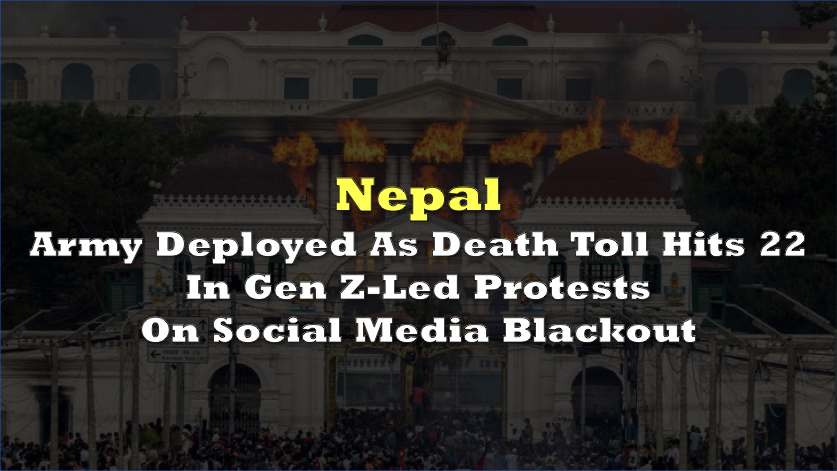Nepal’s army deployed across Kathmandu late Tuesday as the nationwide death toll from two days of protests rose to 22, capping a cascade of events that saw parliament and the Supreme Court set ablaze, the prime minister resign, and the government hurriedly reverse a sweeping social media blackout imposed last week.
By nightfall Tuesday, smoke was rising from Parliament, the Supreme Court and multiple politicians’ residences in the capital after crowds defied a curfew and set fires. Tribhuvan International Airport shut operations as smoke blanketed the valley. Two airports and the Hilton-branded and Varnabas hotels were also damaged.
The Singha Durbar “Lion’s Palace” in Kathmandu, the capital of Nepal, has been entirely destroyed by a fire set earlier today amidst ongoing anti-government riots and civil unrest throughout the country, with the Nepali Army announcing earlier tonight that it would be assuming… pic.twitter.com/LvY76TheYL
— OSINTdefender (@sentdefender) September 9, 2025
Protestors in Nepal overthrew the government in less than 48 hours due to corruption. They refused a curfew, spread protests across all cities, fought police in roaming street battles, burnt down politicians' houses, stole military weapons, stormed the parliament & burnt it,… pic.twitter.com/ewlBnr95vm
— Anonymous (@YourAnonCentral) September 9, 2025
The security pivot came 24 hours after the bloodiest day: on Monday, security forces used live rounds, rubber bullets and water cannons on largely youthful demonstrators, leaving at least 19 dead and hundreds injured. On Tuesday, Nepal’s Civil Service Hospital reported “more than 200” admissions and three additional deaths, pushing the total to 22, while the Health Ministry urged blood donations to treat the wounded.
Reporters described armed men roaming parts of the capital, some civilians holding assault rifles, and even live grenades thrown at a government building. Fires were reported at police stations and lawmakers’ homes. The Supreme Court and an anti-corruption court were also burned.
Late night Tuesday, the Nepal Army announced it would assume responsibility for law and order and opened an “official Army Helpline.” Within hours, soldiers and armed police were on city streets, surrounding groups of demonstrators. Some detainees were forced to their knees with hands behind their heads, according to on-the-ground reporting.
Prime Minister K.P. Sharma Oli—elected in 2024 for a fifth stint and widely seen as leaning toward China—resigned Tuesday as fires raged in the capital. A successor was not named.
Kathmandu mayor Balendra Shah, who had voiced support for the Gen Z-led movement, told protesters, “Dear Gen Z, the resignation of your murderer has come. Now be restrained!!” urging them to negotiate with the army chief and push for parliament’s dissolution.
UN human rights chief Volker Türk called for an investigation into the killings and other “reports of unnecessary and disproportionate use of force.” A joint statement backing the “universal rights of peaceful assembly and freedom of expression” was signed Monday by the US, UK, France, and Japan, joined by Germany, Norway, and Switzerland on Tuesday, bringing signatories to 10.
Social media blackout
The spark was a blanket effort to force platform registration and block access to 26 social media and messaging services, extending a TikTok ban to include Facebook, Instagram, WhatsApp, YouTube, LinkedIn, Reddit, and WeChat, among others.
Officials said they blocked the platforms because they had not complied with new government registration requirements, and they framed the move as enforcement of those rules. Researchers noted the ban went far beyond typical regional restrictions, sweeping in professional and networking sites that people use for jobs and remittances. Many companies refused to register, and Nepal lacked the market leverage to compel compliance, so authorities enforced the rule by cutting access.
Critics and rights groups described the blackout as political censorship designed to tighten control over speech amid mounting anger about corruption and inequality.
The move was fully reversed by Tuesday morning, restoring access to all 26 platforms.
Nepal is in chaos. Angry crowds are chasing ministers in the streets. Govt buildings, hotels, and officials' homes are burning.
— Olga Nesterova (@onestpress) September 9, 2025
The spark? Deep corruption—ignited by a social media ban.
PM has resigned. The govt has collapsed.
Tourists are stranded. The airport is shut. Over… pic.twitter.com/OkYD55Sjum
Nepal has erupted in fury.
— Saint Javelin (@saintjavelin) September 9, 2025
A government attempt to seize control of YouTube, social media, and messaging apps has ignited chaos in Nepal. The president has resigned, and the youth have declared they now control the country. Protesters killed the former prime minister’s wife and… pic.twitter.com/7mS9ahN0Nf
Beneath the censorship furor lay longer-running grievances over corruption, inequality and elite privilege. Images tagged #nepokids circulated widely, purporting to show the lavish lifestyles of politicians’ children, inflaming anger in a country where about one in four people live below the national poverty line.
Transparency scandals have piled up: a parliamentary probe alleged at least $71 million was siphoned from the Pokhara international-airport project via collusion between officials and contractors, and a separate “Bhutanese refugee” scheme saw political figures accused of selling fake US migration pathways to unemployed youth. Few such cases end in convictions.
Unemployment was 12.6% in 2024, with youth joblessness higher and large swaths of informal work uncounted. Roughly 741,000 Nepalis left last year, and an estimated 2 million labor abroad with their $11 billion in remittances equaled more than 26% of GDP in 2024, making social apps a lifeline for families coordinating care and finances.
Information for this briefing was found via The New York Times and the sources mentioned. The author has no securities or affiliations related to this organization. Not a recommendation to buy or sell. Always do additional research and consult a professional before purchasing a security. The author holds no licenses.




